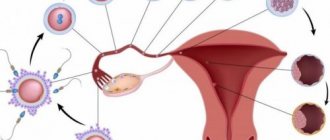Is it possible to find out whether conception has occurred?
After fertilization, changes almost immediately begin to occur in a woman’s body aimed at preparing for the process of pregnancy. The uterus fills with blood, the endometrium changes its structure so that the fertilized egg is securely fixed in the membrane. Almost from the first days after conception, the hormonal background begins to change: hormones are synthesized that ensure the preservation of pregnancy and the harmonious development of the fetus.
But is it possible to notice changes? Modern medicine has come far, and many methods for determining pregnancy have appeared, scientifically sound and effective. Women have access to laboratory tests, and new equipment and high sensitivity of reagents make it possible to detect even minor fluctuations in indicators and deviations from the norm. Therefore, it is quite possible to establish the fact of conception.
Some representatives of the fairer sex claim that on an instinctive or intuitive level they feel that fertilization has occurred, literally from the first days of the development of a new life. But this has not been proven and has no scientific explanation, although scientists do not deny that the body’s sensitivity can be so high that a woman actually immediately perceives changes.
Unusual types of ovulation
Usually, when asked whether it is possible to get pregnant on the 4th day after ovulation or later, gynecologists answer in the negative, but pregnancy still occurs. How is this possible?
Firstly, the ovulatory phase may be incorrectly determined. Many women focus purely on their sensations: changes in discharge, swelling of the breasts, characteristic pain. But such symptoms are not exact, but only approximate, and can be felt even before the egg is released.
Modern methods for determining pregnancy in the early stages
The video is interesting about how to determine pregnancy in the early stages?
To determine that conception has occurred, you can use modern methods of early pregnancy diagnosis, which are used both by specialists and at home. Effective methods are listed below.
Blood test for hCG
HCG or human chorionic gonadotropin is a hormone that begins to be synthesized by chorion tissue after the implantation of the fertilized egg into the uterine lining. As a rule, implantation of the embryo occurs approximately 6-8 days after the fusion of the egg with the sperm, and the concentration of hCG increases almost immediately. Normal levels in non-pregnant women range from 0 to 5 mU/ml.
Blood test for beta hCG.
After fertilization has occurred, already during the first week the amount increases to 25-150 mU/ml, and such a significant excess of the norm in most cases signals the onset of pregnancy at its earliest stages. The increase in concentration is rapid: with normal embryo development, the concentration doubles every two days. You can get tested for hCG at a antenatal clinic, private clinic or laboratory.
Pregnancy tests
The principle of their operation is based on determining the level of hCG. Urine, which also contains human chorionic gonadotropin in sufficient quantities, falls onto the test strip. The reagent applied to it detects excess of the norm and produces a result.
On sale you can find both the simplest standard test strips and more modern ones: inkjet and electronic. Some manufacturers claim that pregnancy can be detected even before the delay due to the high sensitivity of the reagent, but the reliability of the results at this time does not exceed 50-70%, while after the delay it reaches 97-99%.
Ultrasonography
Ultrasound is a modern, reliable hardware method for determining pregnancy, but it is not used for early diagnosis, especially before a delay. The fertilized egg, fixed in the endometrium, will be clearly visible on the monitor of the ultrasound machine during the procedure, when it reaches a size of 8-10 millimeters, otherwise the specialist may confuse the small speck with the relief of the heterogeneous structure of the uterine lining.
The embryo grows up to a centimeter by about the 5th or 6th week of pregnancy (counting from the day of ovulation or fertilization), so conducting an ultrasound examination earlier than this period before the delay is impractical and even sometimes dangerous. The fact is that for early diagnosis, a transvaginal sensor is used, which is placed in the vagina and inserted into the cervix, and such interventions can be dangerous for the embryo if it does not have time to securely fixate.
Basal temperature measurement
Some women use basal temperature to determine ovulation, and fluctuations actually reflect changes occurring in the body. So, after pregnancy, the temperature almost always rises: if before ovulation it fluctuates between 36.4-36.5 degrees, then after fertilization it rises to 37-37.2 degrees and does not fall until the delay. But the results will be accurate and reliable provided that all measurement rules are followed and the menstrual cycle is stable.
Determining pregnancy at home
Any woman who is planning to conceive should keep a personal diary. Firstly, it will help track changes in the body: emotional changes, malaise, lack or increase of appetite, weight gain, and the like. At the planning stage of conception, it is important to undergo examination to be sure of the ability to conceive and bear a healthy child.
The most acceptable period for conceiving a child is considered to be the days of ovulation. It is then that the egg is in an “active” search for sperm. In a reproductively healthy woman, ovulation occurs on the 13-17th day of the menstrual cycle.
Many people ask the question: why know whether conception occurred or not?
The sooner a woman realizes that she is in a position, the better. This will help the expectant mother adjust her lifestyle - eliminate bad habits, trivial behavior, and learn the rules of a balanced diet.
Today, there are several ways to determine conception at home:
- Ultra-sensitive tests. As a rule, you can find out about pregnancy using ultra-sensitive tests on days 10-14. Most often, the second stripe has a pale red tint.
- Folk methods. For example, by the change in color of iodine when it comes into contact with urine. Collect your morning urine and pour it onto paper. Using a pipette, drop iodine onto the soaked paper. The appearance of a blue tint indicates a high probability of conception.
- Basal temperature. It is better to monitor your basal temperature in advance. To do this, you need to keep the same personal diary. When ovulation occurs, the basal temperature can reach 37 degrees Celsius; if these parameters persist and the temperature does not decrease, you are probably pregnant.
- Cervical tightness. If you independently monitor the condition of the cervix, then you can determine without a test whether conception has taken place or not. Under the influence of “pregnant” hormones, the cervix thickens and closes, preventing the passage of all kinds of viruses and bacteria.
Remember that determining pregnancy at home cannot guarantee a 100% result. There are more reliable methods for determining conception, which we will talk about in the next block of the article.
The first signs of conception
If a woman really wants to get pregnant, then she will listen to her body in order to immediately notice any changes indicating conception. And there are some signs that may indicate that fertilization has occurred:
- Change in the nature of discharge. After pregnancy, they may become more abundant, but should not have an unpleasant odor or change color.
- Implantation bleeding. It occurs as a result of a violation of the integrity of the endometrium during implantation of the fertilized egg: small capillaries burst, and a small amount of blood leaves the uterus through the vagina in the form of pinkish or brown discharge. But this sign may be absent or go unnoticed.
- Nagging pain or tension in the lower abdomen that occurs due to the filling of the uterus with blood, the implantation of the fertilized egg into it, or changes in the structure of the organ.
- Increased urination. Although for many it occurs later and is caused by compression of the bladder by the rapidly growing uterus, already in the early stages a woman may begin to visit the toilet somewhat more often. This is due to the rush of blood to the pelvic organs.
- Early toxicosis. It is believed that it is explained by the body’s normal reaction to a foreign body, which is the embryo. But toxicosis often begins later - about 6-7 weeks after conception. And some expectant mothers skip this unpleasant stage altogether.
- Mood swings are caused by changes in hormonal levels, and it is known to directly affect a woman’s emotional state.
- Changes in the mammary glands. Under the influence of changing hormone levels, they can swell and enlarge. The nipples sometimes darken and become more sensitive.
The listed signs should not be considered obvious signals of conception. Firstly, sometimes they occur after a delay, when the fact of pregnancy is confirmed. Secondly, not all women notice any changes. Thirdly, symptoms may indicate problems in the woman’s reproductive system or other important organs.
Causes
Almost any factors related to the negative impact of the environment can provoke premature maturation of the egg. In some women, disruption of natural processes occurs even when climate conditions change . For example, during a vacation or a minor move. Such events are accompanied by internal experiences that are not given any significance, but internal systems react to them quite quickly.
The following factors can trigger the early formation of an egg:
- alcohol or smoking abuse ;
Premature ovulation can occur permanently or temporarily . In the first case, it is an individual feature, in the second, it is the body’s reaction to specific factors.
Determining pregnancy before delay: is it realistic?
In this video, an experienced gynecologist explains how to recognize the first symptoms of pregnancy before delay.
Is it possible to find out whether conception has occurred before the delay? Theoretically, yes, but not in all cases, and there are several reasons for this. The first is the similarity of the first early symptoms of pregnancy with premenstrual syndrome. The second is the duration of the menstrual cycle and the day of ovulation. The egg matures on approximately the 14th day in a 28-day cycle. Conception can occur within 24 hours after it leaves the ruptured follicle. And the first changes begin after the implantation of the fertilized egg into the lining of the uterus, and it occurs after 6-8 days, that is, approximately when the next period should arrive. As a result, the first sign will most likely be a delay.
The third reason is the insignificance of changes in the early stages of pregnancy. They can be so subtle that even detection using modern scientific methods becomes difficult or impossible.
Let's summarize. It is possible to find out about the onset of conception, and for this it is advisable to use modern effective diagnostic methods. But it is problematic to confirm the fact of fertilization before the delay, so it is better to be patient and wait a little so as not to make a mistake.
(votes: 2, rating: 5.00 out of 5)
Share the news on social networks
Ask a Question! You have questions? Feel free to ask any questions! And our staff specialist will help you. Go>>
- Recommended Articles
- How to plan a pregnancy with diabetes?
- How to get pregnant when the uterus is bent?
- Is it possible to get pregnant if you have gynecological and other diseases?
« Previous entry
What day of the cycle does it occur on?
Full maturation of the egg during early ovulation, as a rule, occurs approximately on the 7th–10th day of the cycle. The earliest ovulation can be on the 5th day of the cycle from the date of the start of menstruation, that is, almost the next day after the end of menstruation. Therefore, the opinion that it is impossible to get pregnant immediately after your period is erroneous.
Features of the premature ovulatory period:
- is not a serious deviation from the norm;
Pregnancy test Evitest
Discussion: 16 comments
- Timur:
08/17/2018 at 23:19Good day! In short, the question is tormenting me...can my girlfriend (she is a virgin) be pregnant if [...]?
Answer
Yana (specialist):
08/18/2018 at 12:01
Hello, Timur. Yes, there is such a possibility.
Answer
06.11.2018 at 19:14
I had a strong pull in my lower abdomen, like during menstruation, and there was not much bleeding. Could I be pregnant?
Answer
- Yana (specialist):
11.11.2018 at 21:23
Hello Olga! There is a possibility.
Answer
11/19/2018 at 21:39
Hello, PA occurred before ovulation during and after, since I have 2 women’s calendars according to them and were in effect, from the 4th (November) to the present day. Specifically, ovulation was according to the first calendar on the 12th and on the second on 15-16. When can I take the test? What are the expected symptoms? (If this is the first pregnancy). More than 23 days ago I was in the hospital with polycystic disease, when I was discharged they said that if you want, then go ahead (supposedly you will succeed). What should I do in this situation? What to expect? We really want a baby.
Answer
- Yana (specialist):
11/19/2018 at 10:17 pm
Hello Irina! The test should be done on the first to third day of missed menstruation to know the exact answer. I understand you, the child needs to be planned in advance, you need to lead a healthy lifestyle with your husband and eat right. Don’t set high expectations right away, repeat again and again until you get the result! Believe that you will succeed! Good luck to you!
Answer
01/03/2019 at 03:01
Hello, I have a question. I haven’t had my period for 12 days now, headaches, dizziness, fainting and a little nausea. The other day I looked twice to see if I was in position or not. The first one showed that the second stick was slightly visible, and in the second when I looked there was only one. What could it be?
Answer
- Daria:
01/05/2019 at 00:11
Hello Mesedou! These are clear symptoms of pregnancy and you should consult your doctor.
Answer
01/09/2019 at 00:09
Hello, can I be pregnant if PA occurred before ovulation?
Answer
- Daria:
01/09/2019 at 09:14
Hello Olya, how many days before ovulation did PA occur?
Answer
01/10/2019 at 23:16
Hello. I have plecystic disease and have been treated for 4 years with no results. I stopped taking birth control in December. 17 I had my period. All these 4 years there was no ovulation. And on the night from 1 to 2 I woke up with severe pain in my lower abdomen. Pain like menstruation, it hurt for 2 days. I calculated that it was supposed to be ovulation at this time. PAs are regular every day, every other day, not protected. Now my breasts are swelling, my nipples are sore and sensitive, my lower abdomen is tight, and my urination has become more frequent. There is no delay yet. The test is naturally negative. I haven't felt such feelings for a long time. Do you think pregnancy can be suggested in this case?? I'm afraid of wishful thinking.
Answer
- Daria:
01/12/2019 at 22:03
Hello Tatiana! There is a chance of getting pregnant after stopping birth control, and it is quite high, because ovulation is restored in most cases already in the first cycle. Try repeating the test in a few days; if you feel any complications, consult a doctor.
Answer
04/07/2019 at 13:54
Hello, I had unprotected PA for 2 months, the delay was only 5 days, the discharge was brown, the stomach felt like it was during menstruation, I took a test, but it was negative, is there a chance that I am pregnant?
Answer
- Daria:
04/07/2019 at 19:39
Hello Svetlana! There is a greater chance that there may be deviations, since brown discharge is often a symptom of certain diseases. Therefore, before conceiving a child, I recommend that you first undergo an examination of the organs of the reproductive system.
Answer
Svetlana:
04/07/2019 at 20:46
Regarding this, I’m sure no, I went to get checked a month ago and everything was fine)
How can you find out whether conception has passed or not?
Answer
Daria:
04/08/2019 at 20:18
You can try a hCG test or use a pregnancy test, such as Evitest. Also obvious symptoms may be: headache and lower abdomen, slight increase in temperature and slight bleeding from the vagina (embryo implantation), be careful and prepared, if something bothers you, it is better to consult a doctor immediately!
Answer
Symptoms from the first day of conception
Symptoms that arise from the first days of pregnancy occur occasionally, but from them you can also understand that the woman is in an “interesting position”:
- Swelling of the fingers. Changes in the body provoke fluid retention in the body, and there is a feeling that the fingers have become thicker.
- Headache. Frequent migraines and headaches can be signs of pregnancy.
- Dizziness. Due to pressure surges, from the first days of pregnancy, in most cases in the morning, dizziness may occur.
- Constipation and diarrhea. An increase in the amount of hormones in the blood, the intestines begin to work “sluggishly”, constipation occurs, but more often diarrhea, thus the body makes room for the child. Repeated pregnancies are characterized by signs of hemorrhoids from the first days of conception.
From the first days of pregnancy, a woman may not feel any symptoms. But it is possible that all the signs will appear very clearly and then there will be no doubt about the occurrence of pregnancy.
Early ovulation with a 28-day cycle
In a normal cycle of 28 days, a woman’s ovulatory period occurs in the middle (on day 14 +/- 2 days). The maturation of the egg before the specified period is considered premature; it can be ready for fertilization as early as 7–11 days of the cycle. If the cycle lasts 21 - 25 days, then early ovulation is in this case considered the norm.
If you record the start and end dates of menstruation for several months, and note the corresponding symptoms (characteristic pain and discharge during this period), you can easily independently identify the premature maturation of the egg.
Is it possible to get pregnant after ovulation 3 days later?
To the disturbing question, is it possible to get pregnant after ovulation after 3 days, any doctor will answer with confidence - there is a chance, but minimal . It all depends on the lifespan of the egg - if even after 72 hours it does not partially lose its properties for fertilization, then it is quite possible that everything will be successful and the fastest sperm will manage to attach to its wall.
If pregnancy is planned in advance, then even after 72 hours you should not stop trying to achieve the desired result. The best option is to engage in sexual intercourse up to 7 days before maturation and 1-3 days after that. Of course, this does not mean that you need to torment a man several times a day - nothing good will come of this, because sperm are much more active when a representative of the stronger sex receives the necessary rest.
Is pregnancy possible if the egg matures late?
Women with a late ovulatory period are often concerned about whether it is possible to get pregnant if they ovulate late. To understand this, it is necessary to determine all the factors that led to such a violation. If the problem is caused by pathological reasons, then the process of planning conception may take a little longer than usual, since pathological factors must be eliminated. Usually, with properly selected therapy, the cycle is soon regulated, ovulation is corrected and the desired conception occurs.
Even if the ovulation phase does not occur in the middle of the female cycle, this does not in any way indicate the presence of a pathological disorder. It is important that the egg leaves the ovary 14 days before menstruation. If these time frames shift in any direction, then an examination is necessary, because if the second half of the cycle takes fewer days than the first, then real difficulties may arise with the onset of pregnancy. Conception can occur literally before menstruation, which will subsequently lead to a discrepancy between the obstetric and ultrasound gestation dates. These nuances are extremely important to take into account, since fetal developmental delay may be erroneously diagnosed. A low level of hCG will also be diagnosed, since conception occurred later than usual, so it is necessary to observe the dynamics of the growth of human chorionic gonadotropin.
Why does pain occur?
Pain during ovulation may be a sign of ovulatory syndrome. This is not a deviation, but it is a set of symptoms that bother some women shortly before menstruation. But it is impossible to determine ovulation only by symptoms of pain, because not all women experience them.
In some cases, this is accompanied by bleeding. This can be either normal or a deviation, so you should definitely visit a doctor.
It is possible to understand the origin of pain during menstruation, because the endometrium is detached, the organ contracts and puts pressure on the nerve endings, which gives unpleasant symptoms. With ovulatory pain everything is more complicated.
Why is ovulation accompanied by pain:
- hormones and a burst follicle affect the uterus, causing it to contract;
- At the end of the formation of the egg, the ovary begins to stretch, which causes discomfort;
- pressure on the follicle also causes discomfort;
- when the walls of the follicle are damaged, the vessels burst, and their contents enter the abdominal cavity, causing pain;
- The fallopian tubes contract as the egg moves.
Some women are not at all familiar with pain during ovulation. If at some point it appears, you should immediately be examined by a doctor, because this may indicate the development of a pathological process.
In some cases, a woman may experience typical ovulation symptoms after a hysterectomy. This is due to hormonal imbalance and requires special treatment.










